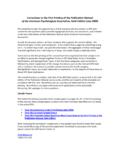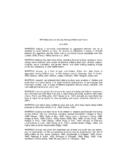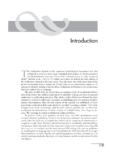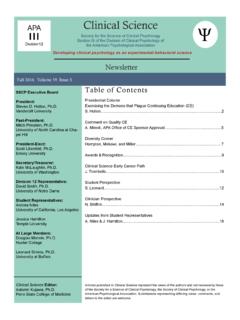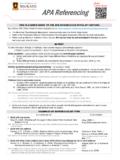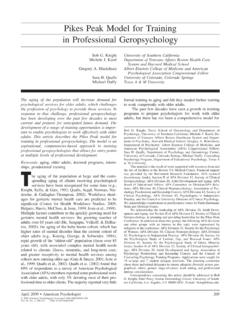Transcription of Examples of Successful DRM Reforms and the Role …
1 Examples of Successful DRM Reforms and the Role of international Co-operationDiscussion PaperExamples of Successful DRM Reforms and the Role of international Co-operationDiscussion PaperJuly 2015iSpecial Thanks to:Ghana Revenue Authority Ministry of Finance, Afghanistan Ministry of Finance and Treasury, Bosnia and Herzegovina Ministry of Finance, El Salvador Ministry of Finance, Georgia Ministry of Finance and Economic Planning, Rwanda Ministry of Finance, Vietnamcontent | iiContentivTables, Figures, BoxesvAcronymsviiExecutive Summary1 Section 1. Introduction2 Challenges for Developing Countries 3 What do We Know About Tax reform ?4 Aid and Tax ReformThe Main international Actors5 Aid Modalities for Tax Reform7 Section 2. Case Studies81. AfghanistanTax Reform10 ResultsInternational Co-operation112.
2 BangladeshTax ReformResults12 international Co-operation133. Bosnia and Herzegovina (BiH)Tax Reform15 Results16 international Co-operation174. GeorgiaTax Reform19 Results20 international Co-operationiii205. ParaguayTax Reform22 ResultsInternational Co-operation236. RwandaTax Reform24 Results25 international Co-operation267. VietnamTax Reform27 Results29 international Co-operation30 Section 3. Findings and Conclusions31 General FindingsFindings On international Co-operation and Assistance34 Technical Findings37 Annex: Indicators38 Indicators of Tax PerformanceTax RevenueBase Broadening40 Improving the Business Enabling EnvironmentIndicators of Use of Increased Revenues for Development Purposes41 References45 Imprintcontent | iv9 Table 1: Afghanistan Tax Performance Indicators12 Table 2: Bangladesh Tax Performance Indicators15 Table 3: Bosnia and Herzegovina Tax Performance Indicators 18 Table 4: Georgia Tax Performance Indicators19 Table 5: Social Spending21 Table 6: Paraguay Tax Performance Indicators24 Table 7: Rwanda Tax Performance Indicators25 Table 8: Registered Taxpayers in Rwanda28 Table 9.
3 Vietnam Tax Performance Indicators39 Table 10: Tax System Performance Indicators3 Figure 1: Tax Revenue as Percentage of GDP in Low and Middle Income Countries14 Figure 2: Registered Taxpayers in BiH6 Box 1: Principles for international Engagement in Supporting Developing Countries in Revenue Matters33 Box 2: Revenue Increases can be Attributed to Well-Monitored Capacity Development in international Tax Issues35 Box 3: Simplifying the Tax Administration to Increase Efficiency in Ghana36 Box 4: Creation of the Transparency and Anti-Corruption Unit of the Ministry of Finance of El SalvadorTablesFiguresBoxesvAcronyms(A)Eo I(Automatic) Exchange of InformationAPA Advance Pricing AgreementsASEANA ssociation of Southeast Asian NationsARDA fghanistan Revenue DepartmentBEPSBase Erosion and Profit ShiftingBiHBosnia and HerzegovinaBRTB usiness Receipts TaxCADEPC entro de An lisis y Difusi n de la Econom a ParaguayaCEPALC omisi n Econ mica para Am rica Latina y el CaribeCITC orporate (Company)
4 Income TaxCITPRODC orporate Income Tax ProductivityDfIDUK Department for international DevelopmentDIED eutsches Institut f r Entwicklungspolitik DRMD omestic Resource MobilisationEACEast African CommunityERCAE thiopian Revenues and Customs AuthorityEUEuropean UnionFADF iscal Affairs Department FfDFinancing for DevelopmentFPUF iscal Policy UnitGDPG ross Domestic ProductGDTG eneral Department of Taxation GHSG hanaian CediGIZD eutsche Gesellschaft f r Internationale Zusammenarbeit GIRoAGovernment of the Islamic Republic of AfghanistanGOBG overnment of BangladeshGOPG overnment of ParaguayGRA Ghana Revenue AuthorityGVNG overnment of VietnamHMRCHer Majesty s Royal Customs IMFI nternational Monetary FundISTDI ncome and Sales Tax Department ITInformation TechnologyITCI nternational Tax CompactJICAJ apanese international Cooperation AgencyKMKonvertible Mark acronyms | viKRAK enya Revenue AuthorityLDCL east Developed CountryLTOL arge Taxpayers OfficeLTUL arge Taxpayers UnitMOFM inistry of FinanceMTOM edium Taxpayers OfficeNBRB angladesh National Board of RevenueOECDO rganisation for Economic Co-operation and Development OHRO ffice of the High RepresentativePAYE Pay as you Earn PEPFARP resident s Emergency Plan for AIDS ReliefPIT Personal Income TaxPITPRODP ersonal Income Tax ProductivityRSRepublic of Serbia RRAR wanda Revenue AuthoritySAAS tabilization and Association AgreementSDGsSustainable Development GoalsSIGTASS tandardized Integrated Government Tax Administration SystemSMES mall and Medium-Sized EnterprisesSOES tate-Owned
5 EnterpriseSRSS tate Revenue Service TACTSTax Administration Capacity and Taxpayer ServicesTAMPTax Administration ProjectTIN Taxpayer Identification NumberUKUnited KingdomUNUnited NationsUNDPU nited Nations Development ProgrammeUSUnited StatesUSAIDUS Agency for international DevelopmentUSDU nited States DollarUTACEl Salvador Transparency and Anti-Corruption Unit VATV alue Added TaxVATGCRVAT Gross Compliance RatioWDIW orld Development IndicatorsWTOW orld Trade OrganizationZRAZ ambia Revenue AuthorityExecutive Summaryexecutive summary | viiiThis study adds to the evidence base of Successful tax Reforms bygovernments in developing countries where international supporthas helped. Introduction and BackgroundTax and non-tax revenue are vital components of domestic resource mobilisation(DRM), aimed at providing governments with the funds needed to invest in devel-opment, relieve poverty and deliver public services.
6 Raising tax revenue posesmany challenges for developing countries such as a difficult external environmentand weak administrative capacity. Specific challenges that loom especially largein developing countries include weak tax administrations, low taxpayer moraleand compliance, corruption, a small tax base and the missing reciprocal linkbetween tax and public and social expenditures. The implications of a more open international trading system are posing challengesfor international tax matters. Developing countries rely more heavily on corporateincome tax and there is a greater exposure to base erosion issues and internationaltax evasion. The problems are the subject of the G20/OECD Base Erosion ProfitShifting (BEPS) Project and the Global Forum on Transparency and Exchange ofInformation for Tax Purposes which provide tools to enhance international taxtransparency and shows that progress can be made by developing countries in the rightenvironment.
7 Tax to gross domestic product (GDP) ratios showed marked resilienceduring the global financial crisis and there is a general improving trend. Commonelements of success in developing countries are sustained political commitmentat the highest levels of government, administrative Reforms aligned closely withpolicy changes, and strong leadership of the revenue administration. Differentnational tax Reforms largely share a common toolbox . Broadly speaking, reformsin tax policy have relied primarily on broad-based taxes at moderate rates. Aid for tax reform is relatively low, but it has proven effective. Developing countriescan rely upon various actors in the international community to support their taxreforms. Aid is delivered in a number of ways. There is no one best approach totax reform and donor programmes should be customised to fit country matters most is ownership and leadership in the country concerned.
8 IxThe Case StudiesSeven case studies form the core of this paper covering countries in Asia (Bangla -desh Vietnam and Afghanistan), Europe (Bosnia and Herzegovina, and Georgia),Latin America (Paraguay), and sub-Saharan Africa (Rwanda). The review shows thereforms carried out by these countries, the results and the international cooperationthat helped achieve them. General FindingsThe general findings from the case studies include: Tax reform in the case countries led to significant increases of the tax / GDP in fragile environments revenues increased significantly. Tax reform can support trade some country studies the contribution of import duties to tax revenues declined during the reform period. Tax Reforms brought other quantifiable costs for the public and for business were reduced in several country studies.
9 DRM has an impact on each of the country studies, increased revenues funded development needs, whether education, health, or the overall development budget. Findings on international Co-operation and Assistance: international co-operation can make very important contributions to tax assistance supported reform in each of the case countries in a varietyof ways. international co-operation was strategically important in terms of policyanalysis and recommendations. international organisations in several casesundertook diagnostic studies, whether of tax policy or tax administration, whichgovernments usually followed up with decisions to develop reform programmesand sought resources to implement them, including further technical assistanceand capacity support. All the seven cases show that building local capacity at the level of the individual, the organisation, and the enabling environment contributes to institutional sustainability.
10 Attributing reform outcomes to international assistance can be a challenge and requires robust monitoring and review has shown in sevencountries how international co-operation can be supportive of tax summary | xNevertheless, it is very difficult to attribute outcomes to the specific assistanceor co-operation provided by donors. international organisations and donoragencies should establish robust monitoring and evaluation recent work shows how well monitored revenue gains can be attributedto both reforming governments and timely technical assistance, in areas suchas transfer pricing. reform is a long-term process which often implies steps forward and reform , especially reform of the tax administration, is a long process anddonors can expect that reform efforts might take a decade to have a profoundimpact.










